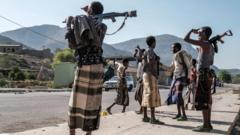The ban, predicated on the party's failure to convene a general assembly, has sparked fears of rekindled violence as Ethiopia approaches nationwide elections scheduled for next June. The TPLF, historically dominant in Ethiopian politics, led a coalition that overthrew the previous regime in 1991, controlling the country until political shifts in 2018 led to its dissolution. Despite the establishment of an interim administration in early 2023 as part of the peace deal, internal divisions have prevented the TPLF from holding elections.
In a formal protest, TPLF leaders have urged the African Union to intervene, arguing that the ban strips the party of the rights reassured by the Pretoria Agreement. TPLF deputy chairman Ammanuel Assefa highlighted that the electoral board’s decision could jeopardize the fragile peace, which has already delayed the return of nearly one million displaced individuals from the conflict. Both the U.S. and European nations have echoed the necessity of maintaining the peace process, emphasizing that a return to violence would be catastrophic.
In a formal protest, TPLF leaders have urged the African Union to intervene, arguing that the ban strips the party of the rights reassured by the Pretoria Agreement. TPLF deputy chairman Ammanuel Assefa highlighted that the electoral board’s decision could jeopardize the fragile peace, which has already delayed the return of nearly one million displaced individuals from the conflict. Both the U.S. and European nations have echoed the necessity of maintaining the peace process, emphasizing that a return to violence would be catastrophic.




















